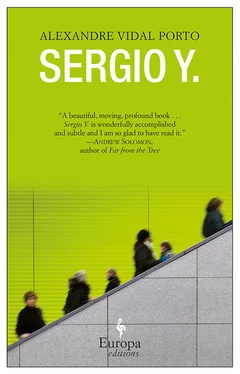He had enjoyed good health his entire life. He was 1.87 meters tall and weighed 78 kilos. He did not suffer from any congenital or infectious diseases. He had perfect teeth. Sergio Y. had the physical prerequisites for happiness in abundance.
He had led a sheltered life. Until the age of ten, he had always had a nanny to care for him when he was not in school. His parents were not always available. His father he saw practically only on weekends. His mother he saw sometimes before going to school in the morning and at dinnertime.
He had never seen his parents fight. Sergio’s impression was that theirs was a good marriage. He had had a twin brother born with anencephaly who died eight days after birth. Sergio Y.’s only visual memory of his brother was based on a photo he found many years ago, while playing dress-up in his parents’ bedroom and going through their wardrobe. There, in one of the drawers, was a photo of a three-day-old baby, eyes closed, face sunken, nestled in his mother’s arms, with a cap pulled over his eyebrows to hide his missing skull.
He avoided thinking about that picture. He never opened that drawer again, but he told me he did not believe Roberto’s death had anything to do with his sense of unhappiness. He assured me that it did not weigh on him at all.
“My parents made sure I was spared. They never mentioned my brother’s death. I never shared in their pain. Had I not found that picture in my mother’s wardrobe, I think I’d never have known I’d even had a brother.”
In our sessions, he spoke of his parents’ expectations and his indecision when it came to his career choice. He considered himself “tough to make friends with.” Sometimes he mentioned Sandra, a classmate, for whom he had apparently harbored platonic feelings. He told me he “admired her way of being.” When asked if he would like her to be his girlfriend, he said he had “more urgent things to take care of in my life.”
I was curious at the mention of “more urgent things,” but I wanted him to introduce them spontaneously. I had no clear understanding of what Sergio sought in therapy. I found him mysterious. It seemed better to give it time. So, that is what I decided to do.
Over the course of our sessions, no one theme took precedence. Our therapy was a patchwork quilt. My impression was that, as doctor and patient, we had a nice dynamic, and even a productive one at times, but at the same time an overly slow and cautious one.
One of the recurring themes in our talks was Areg, his great-grandfather, who took the decision to leave Armenia and emigrate to Brazil. Another constant theme was his unhappy condition.
He considered himself unhappy even if it was not readily apparent. He was sober. His grief did not show. If he did not reveal his feelings, no one would have known. No one would have even suspected.
I believe this sobriety was the expression of a soul mature beyond his years. He did not deny his unhappy condition. On the contrary, he recognized it, but he rejected it, he tried to escape it, to defeat it. His seeking therapy was evidence of this. However, he felt no need to publicly display it.
With me he would speak more of his family than of himself. I have the impression that in speaking of his family, he wanted to expose the history from which he came, to show how he fit into a broader narrative. Sergio Y. wanted to make sense of himself, to understand the genealogy of his inescapable unhappiness in order, I hoped, to overcome it.
The most interesting and productive sessions we had were those where Sergio Y. spoke of his great-grandfather, Areg Yacoubian, who at sixteen boarded a ship for Brazil.
Sergio told me how his great-grandfather had settled in the city of Belém, where a countryman, Hagop Moskofian, had opened a wholesale distribution company four years earlier. His ship arrived in Pará in March of 1915 after making stops in Recife and Fortaleza.
Areg’s first job was as a warehouse man. He prided himself on being fast and keeping tight control over inventory. He helped Hagop as needed. For twenty minutes every night before bed, he would struggle to read the news in the Noticias do Pará in an attempt to teach himself Portuguese. He had a reputation for being frugal and good-natured and living for his work.
When Areg arrived in Belém, Hagop set him up in a small room above the store, which Areg slowly appropriated during his first year on the job. The space soon became his bedroom—“and his dream room,” as Sergio was keen to stress, quoting his great-grandfather.
In 1919, fellow countrymen arriving from Constantinople, fleeing the Turkish massacres, brought news that Areg’s family had been deported from Erzerum, where they lived, and had not been seen since. It was later learned that on the same day, in a single blow, Areg lost his entire family — his parents and eleven brothers, who had made the decision not to seek lives happier than those terminated at the hands of Ottoman troops.
According to what Sergio told me — so he had been told — after Areg, the last surviving Yacoubian, learned of his family’s death, he never again shed a tear for any reason, either happy or sad.
He knew how to prosper. He became Hagop’s partner in the company and, in 1924, at the age of twenty-five, he married Laila, the only daughter of Samir Simon, who owned a women’s clothing store in the Comércio district.
Over time, the two Armenians forged a brotherly friendship that lasted a lifetime. They became best friends. Areg continued to be Hagop’s partner, but he also opened other businesses by himself or with other partners. He sold everything from toys to industrial ovens. At twelve, his only child, Hagopinho, already worked with him at Laila Stores.
By the time he died at 103, he owned a commercial and real estate empire that practically stretched throughout Brazil.
Areg’s importance in forming Sergio Y.’s worldview was immense. This became clear again when, not very long ago, I played back the recording where he told me about his great-grandfather’s hundredth birthday party.
I have a recurring dream of my great-grandfather Areg. In the dream, he gives a speech, but I’m the only person in the audience. He begins, but he speaks softly, and I can barely hear him. I move closer, but I can only make out his last word: “happy.” I know why I have this dream. It’s because of my memories of Areg’s hundredth birthday party, in Pará. I went. My whole family traveled to Belém. My parents, my uncle Elias, my aunt Valéria, my cousin José. Everyone. We all stayed in my grandfather Hagopinho’s house.
The party was held at my grandparents’. They’d hired a caterer from São Paulo and set up tables on the porch and in the garden. They even set up a tent in case of rain. Between relatives and guests, there were about fifty people. After we all sang “Happy Birthday,” Areg called everybody’s attention by tapping his wineglass with a fork. When everyone was quiet, he stood. He took out a sheet of paper from his pocket. He held the paper with both hands and stared at it, and it seemed as if he would read from it, but instead he folded the paper and laid it on the table. He cleared his throat and began.
At one hundred, Areg was in good health. He was full of life. He walked slowly but firmly. He spoke softly, but his message always seemed positive. I think most of the guests that evening could not even hear him. But I was close to him, sitting at the family table, and I heard every word. I realized he was choking up and stuttering a bit. I was about eleven or twelve at the time. I remember it all in detail. I’ve never been able to forget what he said. I think I’m here today because of that day. It was because of his speech that I understood I needed to do something to be happy. I watched Areg’s birthday video so often I know the speech by heart. You want to see? I can even do his accent. […]
Читать дальше












